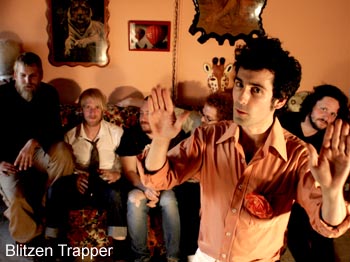Blitzen Trapper interview
Blitzen Trapper
Werewolves Of Portland

The Internet has cost musicians the ability to surprise. As soon as they record and upload anything worth hearing, their work goes viral. So by the time there’s an album’s worth of songs, the public has nothing but backlash. Not only have we stripped them of the power to change your life (as NME used to tout), but by exposing young artists so early we’ve sent this country’s infant-band-mortality rate sky high.
Appearing: Sunday, November 9th at Schubas in Chicago.
Being jaded, never a problem in the music industry, has become paralyzing and we pine for the days when quality rock bands developed at their own pace. You discovered something on your own and treasured it almost as if the music was yours. Because you can’t anymore. Or so we thought.
In spring 2007, Web-based arsonists sparked a forest fire for Blitzen Trapper’s Wild Mountain Nation. Sub Pop Records quickly swooped for the Portland, Oregon -based band and a little more than a year later released the 13-track Furr. So what, right?
But Blitzen Trapper aren’t another cub project. Even passive research reveals Furr to be the band’s fourth album in a string of musical experiments that have drawn comparisons to The Grateful Dead, The Flaming Lips, Nitty Gritty Dirt Band, early Beck, and Of Montreal. The old model survives!
“It’s not that hard to stay unknown,” laughs frontman Eric Earley. “It’s pretty easy, actually.”
That doesn’t seem likely in an age where music isn’t so much heard as disseminated. One album of anonymity? O.K., if only friends and family bought it. But a second?
“We never really did any press or touring of any kind before Wild Mountain Nation,” he explains. “It was kind of like hobby records before we decided to put it out. We put a lot of money and effort into getting it out there. I mean, a record does well because it’s a good record, not because of anything else, really. But as long as there’s stuff written about it and people do see it . . .”
Earley is careful to deflect the idea their obscurity was ideological. “We just never toured. We never had any money to do it. And there wasn’t any reason to do it, because we didn’t have any press or label or anything like that going on. It would have just been a pointless venture in the end. Touring is expensive as far as gas and not working and what not. And if it’s compounded by not having any press and no one’s at your shows, then it’s totally pointless.”
For a West Coast creative type, his thought process is obscenely logical: Have no money, can’t tour. When their third album found people willing to write about it, money from the sales introduced the inverse: Have money, can tour.
“None of us were doing anything,” is the picture Earley paints. “We were just hanging around Portland because it’s cheap and it’s fun. When Wild Mountain Nation did really well and we got a booking agent and all that, we were just like, ‘I guess we can [tour],’ and took off. And Wild Mountain Nation did so good we never had to go back to our jobs. We did go through a lot of years where I would have liked to have been touring but we couldn’t afford it. It was nice, when we did start touring, to not have to worry about jobs.”
Blitzen Trapper have no problems with Portland’s crunchy atmosphere — liberal, isolated, inexpensive. The band generally hole-up in Sally Mack’s School Of Dance, an arts building inhabited by all sorts of characters (including amber-haired dance instructor Mack and labelmates The Helio Sequence), so Earley can track his boundless ideas. “It’s a shared, big building with all kinds of rooms and spaces in it. There’s a bunch of bands and we had a big room that we used to turn into a studio. It’s mostly smaller local bands rehearsing. All the piano on the record, which is quite a bit, I recorded on this old piano that we rolled in. They left it in the building and we took it.
“There wasn’t really any plan,” Earley defers. “It’s all new material. The songs were being written and recorded all the way up through February. It wasn’t like Wild Mountain Nation where I made it in three months solid and that was it.”
— Steve Forstneger
For the full story, grab the November issue, available free throughout Chicagoland.











